SEO in 2022 is becoming a priority for small businesses as the digital age continues to evolve. Visual Objects surveyed 1,003 small business owners and managers on their SEO tactics for 2022.
Search engine optimization (SEO) has been a buzzword in the online world since its inception over two decades ago.
It’s not a shock to well-established businesses that SEO and search engines have changed the way consumers find information online. Small businesses are beginning to see how SEO strategies can take their business to new heights.
SEO for small businesses, if done well, can lead to an increase in revenue, more prominence in search, and new customers and leads.
Our data found that nearly half of small businesses (47%) do not currently invest in SEO.
So why aren’t more small businesses investing in SEO?
Visual Objects surveyed 1,003 small business owners and managers on their plans for SEO in 2022. Many small businesses find themselves confident in SEO strategies and know which tactics to focus on, but lack of use implies that some small businesses are skeptical about executing SEO for their business.
Our Findings
- Almost half of small businesses (47%) are not currently investing in SEO, but the tide is starting to turn for beginners. In 2021, over a quarter of small businesses (27%) began investing in SEO – a sign that smaller companies are beginning to see the long-term benefits. Twenty-five percent (25%) plan to in 2022.
- Small businesses cite keyword research (43%), technical SEO optimization (40%), and local search optimization (37%) as their main SEO tactics.
- Twenty-one percent of small businesses (21%) believe that website engagement is the most important metric for tracking company success, showcasing the need for a well-optimized website.
- Over 40% of small businesses use in-house SEO software and tools instead of hiring an outside party, suggesting that internal knowledge benefits SEO strategies.
- Most small businesses (79%) are confident in their understanding of SEO best practices despite the lack of use for many small businesses.
In need of an SEO agency? Check out our directory of skilled service providers.
Several Small Businesses Just Started SEO Programs in 2021
Search engine optimization (SEO) is defined as a process to improve your website's visibility when potential customers search for your business, service, or product through search engines.
Companies want potential customers to find their business. Small businesses began making strides in 2021 to achieve this through SEO.
Twenty-seven percent of small businesses (27%) began investing in SEO in 2021.
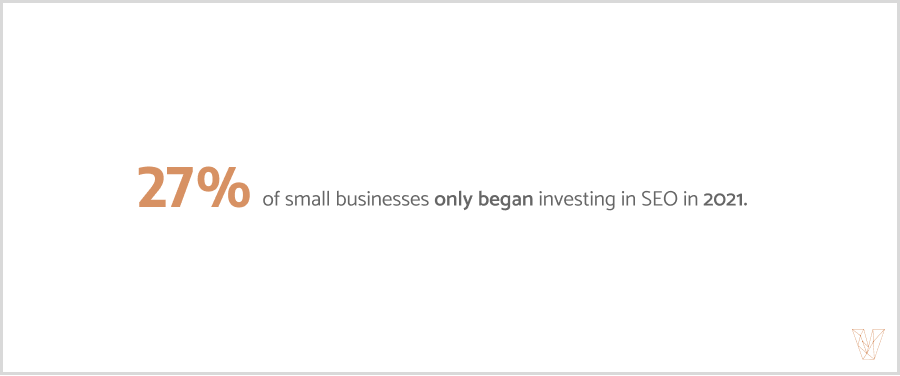
A quarter of small businesses (25%) plan to do so in 2022.
Why are small businesses just now venturing into the SEO space?
Teresha Aird, co-founder and CMO at Offices.net, an online brokerage, believes that businesses are learning about the impact of SEO because of the pandemic.
“The pandemic provided many small businesses with the downtime to invest in their online presence as they attempted to capitalize on increased online purchasing activity,” Aird said.
“The pandemic provided many small businesses with the downtime to invest in their online presence as they attempted to capitalize on increased online purchasing activity”
Aird says that investment in SEO will help small businesses with:
- Ranking in the top results
- Encouraging additional web traffic
- Boosting sales
Delays with investing in SEO are likely due to the lack of immediacy of results — it often takes upwards of 3 months to see changes in performance after implementing SEO strategies.
Additionally, businesses must face the unpredictability of frequent algorithm updates that impact traffic to be successful in SEO.
“I think a lot of businesses struggle to understand the intricacies of SEO, instead, perceiving it as some sort of ‘silver bullet’ to immediately improve their organic search results and generate sales,” Aird said.
Aird recommends that businesses start their SEO journey with realistic expectations.
As small businesses are forming their SEO strategies in 2022, it is imperative for them to think about their overall goals.
Small Businesses Use Three Key Tactics to Optimize SEO Strategies
For the small businesses that currently use SEO, their focus is among three key strategies.
The most popular SEO tactic among small businesses in 2022 are:
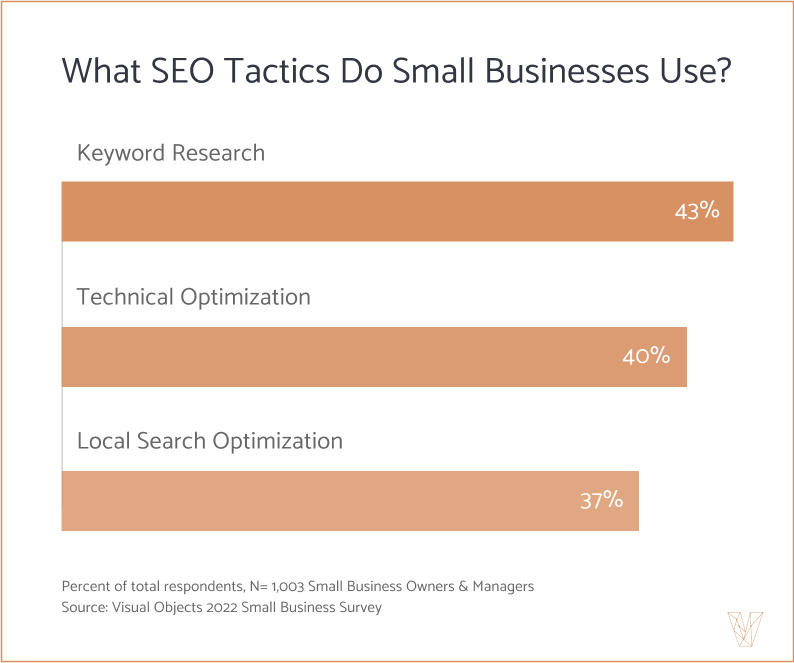
Small businesses also use video content creation (36%), UX optimization (30%), and written content creation (30%) as SEO tactics for their business.
An SEO agency can perform any of these SEO services for small businesses.
Keyword Research Requires Proactive Targeting
Nearly half of small businesses (43%) use keyword research in their current SEO strategy.
Keyword research is a popular strategy that involves finding and analyzing search terms that people enter into search engines with the goal of finding information.
For example, if you are searching for new food for your puppy, you might search the term “dog food brands” on Google.

With that search, you will find different dog food brands (along with a variety of ads). It is clear that Chewy dominates for that keyword since it appears number one underneath paid Google advertisements.
For more research on the state of advertising, read this: 2022 Small Business Advertising Report
To start, make a list of relevant topics regarding your business and then think of buzz words that fit within those topic buckets. Analyze those keywords through an explorer tool.
Full keyword research can be completed by SEO teams through tools like Ahrefs, Moz, and Google Keyword Planner. These tools can find the keyword difficulty, search volume, and relevant questions that come with each option. Businesses can also see where their competitors are.
While keyword research is an easy way to have your company dominate SERPs (search engine results pages), it is important for small businesses to avoid keyword stuffing.
Keyword stuffing is when keyword research and implementation goes bad – referring to the loading or “stuffing” of keywords in an attempt to manipulate a webpage ranking on search engines.
If your page is full of needless keywords, it will negatively affect your chances of ranking.
Stay proactive, smart, and current while performing keyword research.
Technical Optimization Focuses on Performance
Two-fifths of small businesses (40%) use technical optimization.
Technical optimization refers to improving the technical aspects of a website to improve its rank or performance on search engines.
Optimizing a website helps with speed, page experience, and other key factors that make a site crawlable for search engines.
Other technical optimization strategies include:
- Fixing duplicate content
- Ensuring your site is mobile optimized
- Fixing any links
- Add metatags and structured data markup to your website.
Companies can use tools like Screaming Frog, DeepCrawl, and Google Search Console to assist with technical optimization.
Local Search Optimization Helps Domination
Over 35% of small businesses use local search optimization as part of their overall SEO strategy.
Local search optimization refers to a strategy that helps your business be more visible in local search results.
For example, if you Google “app developers in DC,” you’ll find a directory of the top service providers for app development in the Washington DC region.
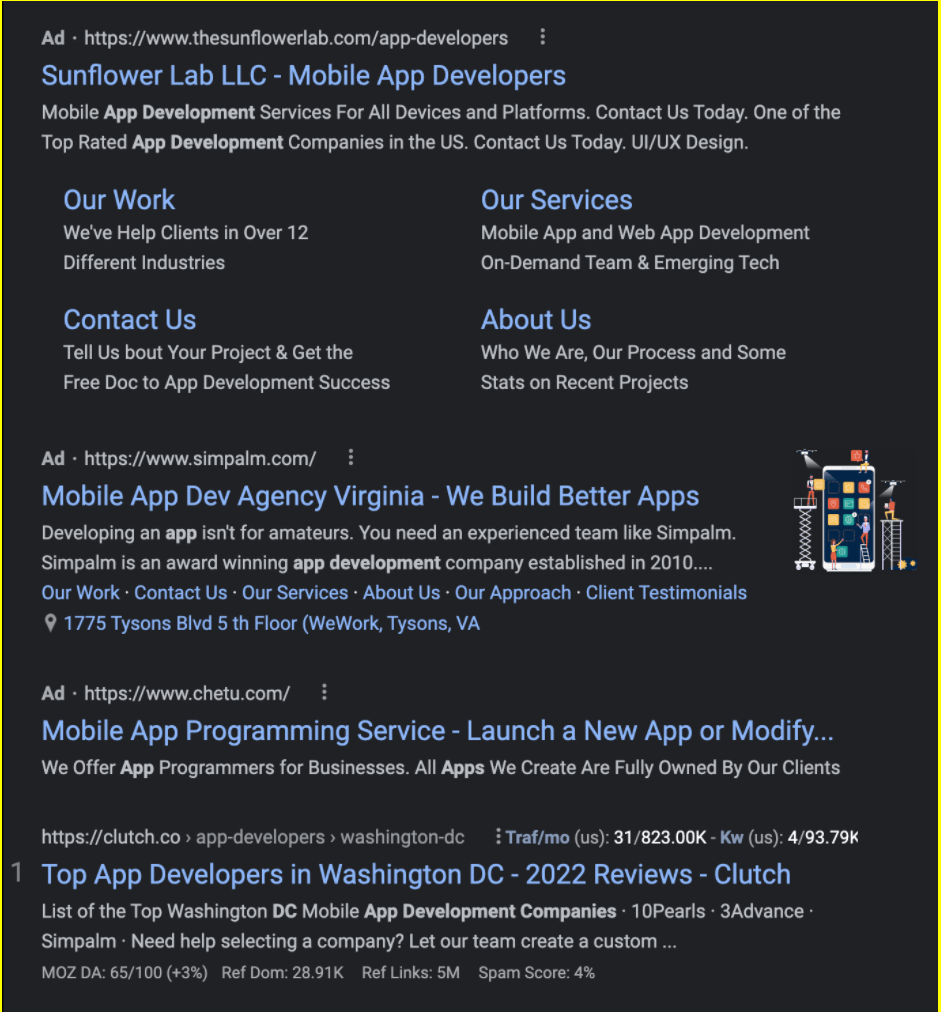
Your search results will also include several app development companies based in the region – their position on the first page helps them connect to potential buyers faster.
Common tasks with Local SEO include:
- Optimizing a Google My Business profile
- Finding local keywords
- Online reviews
- Social media shares
Google scans through its index to provide the best results for a person’s query based on where they’re located.
Aaron Gray, co-founder of NO-BS Marketplace, an SEO platform, encourages small businesses to focus on prioritizing when it comes to SEO.
“SEO has a massive scope…make improvements one at a time,” Gray said. “By focusing your efforts on just one pillar of SEO, such as technical development, you can end up with a site that is faster, more mobile-friendly, and easier to index or you could improve your on-site SEO by making incremental improvements to your keyword usage and meta tagging.”
All of these SEO tactics can be performed effectively by an in-house team, which should encourage small businesses to invest more in SEO.
Additional Reading: 'Top 7 SEO Trends to Skyrocket Your Traffic'
SEO Generates Website Engagement for Small Businesses
A well-optimized website is crucial for small business success.
Over 20% of small businesses (21%) cite website engagement as the most important metric to track to validate an SEO strategy.
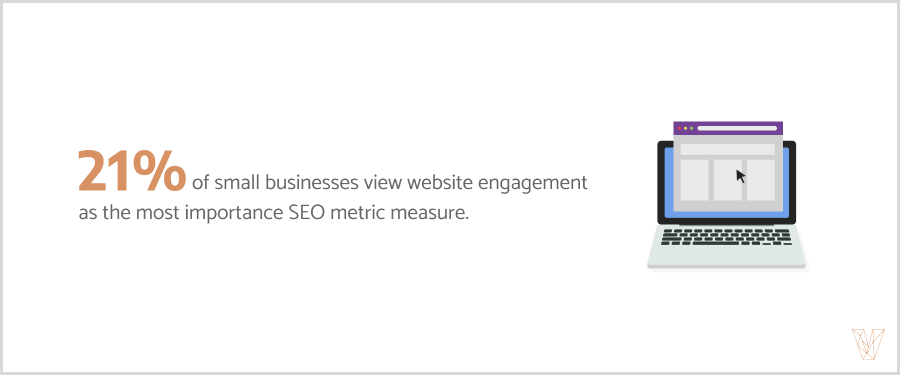
Website engagement is a value that’s measured by how well your site users are enjoying or engaging with your website.
Aird believes that engagement is more vital for small businesses because it indicates that your marketing and advertising strategies are striking a chord with users.
“Low levels of engagement might mean that users don’t think your product or service is particularly relevant to what they’re searching for, meaning that you’re either targeting the wrong keywords or failing to effectively communicate what your website offers,” Aird said.
Website engagement factors in the following:
| Bounce rate | The percentage of visitors who leave a site after viewing one page |
| Session duration | The time frame during when regular active interactions are happening from a site user |
| Clickthrough rate (CTR) | Number of clicks your ad receives divided by the number of times your ad is shown |
| Time on page | Time difference between the point when a person lands on the page and when they move to the next one |
“Low levels of engagement might mean that users don’t think your product or service is particularly relevant to what they’re searching for, meaning that you’re either targeting the wrong keywords or failing to effectively communicate what your website offers”
Having an optimized website increases engagement for visitors, which converts them to lasting customers.
SEO Software & Tools Are Leveraged by Small Businesses
SEO services can be performed from anywhere and by anyone.
Forty-two percent of small businesses (42%) that use SEO services for their business leverage SEO software and tools.
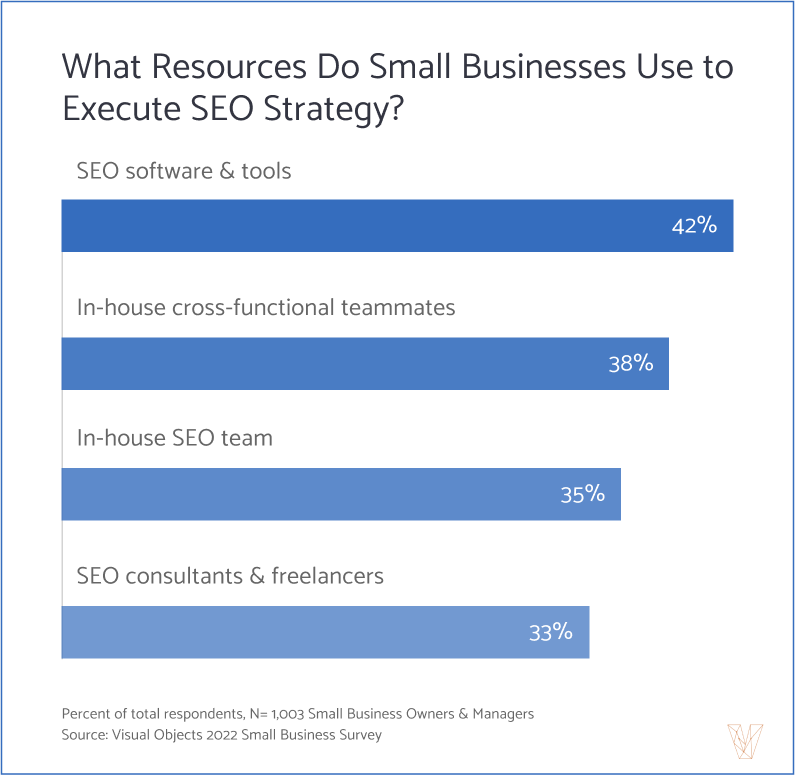
Outside of software and tools, small businesses use in-house employees that work with SEO and other responsibilities (38%), in-house employees that’s only responsibility is SEO (35%), and SEO consultants and freelancers (33%).
Small businesses likely invest more in tools and software that they can operate in-house because of how their employees are engrained in their overall web strategy mission.
Lark Allen, content marketing specialist at Drive Research, believes the answer is accessibility.
“One reason small businesses may like using SEO software versus consulting is accessibility,” Allen said. “When using these platforms, individuals can immediately access specific information whenever, wherever.”
Allen’s company hires a marketing team to publish content daily, but also invest in Ahrefs.
“Ahrefs gives very specific insight into aspects of a brand, like domain rating, backlinks, referring domains, and more,” Allen said. “This allows us to gauge where we stand in terms of site visitors.”
The cost is likely a big reason why companies, small businesses in particular, are focusing on in-house support.
“Small businesses typically prefer to keep SEO tracking in-house due to the high costs associated with hiring professional consultants and the additional control that bringing in in-house provides,” Aird said.
Aird continues that, “many small businesses aren’t looking to implement a groundbreaking SEO strategy, instead of focusing on nailing the fundamentals to ensure that their business has the best possible chance to rank.”
Start nailing your small business SEO strategy with these tools:
SEO Software Tools for Small Businesses
| SEO Tool | Key Features | Price |
| Ahrefs |
- Site audit tools -Competitor research -Rank tracking |
-Plans range from $100-$1,000 per month |
| SEMRush |
- On-page SEO checker -Traffic insights -Site audit tools |
-Business plans are $450 per month |
| Moz Pro |
- Page optimization feature -Traffic analysis -Backlink analysis |
-Standard to premium plans range from $99-$600 per month |
| Ubersuggest |
-Keyword finder tool -Top SEO pages report -Backlink data |
-Plans range from $30-$100 per month |
By investing in SEO software and tools, small businesses are using their employees to make the best decisions for their websites with their internal knowledge.
Most Small Businesses Are Confident in Their SEO Understanding
Despite the time it might take, SEO strategies are proven to work, which might be why small businesses feel secure with SEO practices.
A majority of small businesses (79%) are confident in their understanding of SEO.
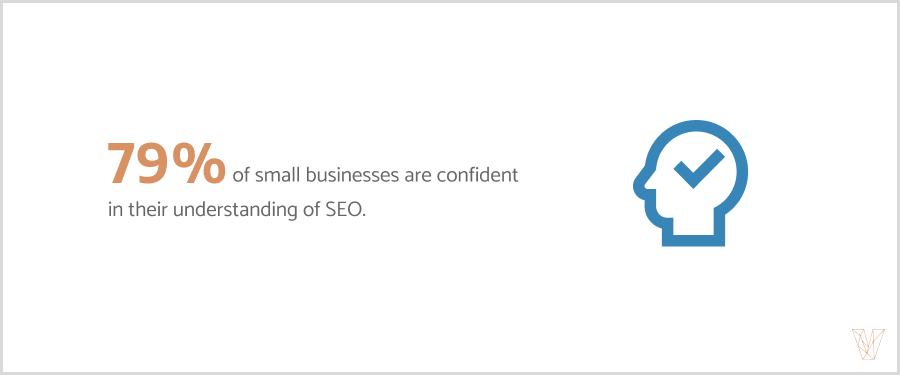
As she has become more comfortable in her role, Allen’s knowledge of SEO has grown along with her confidence.
“My confidence level in implementing SEO initiatives has gotten much higher,” Allen said.
If more small businesses take a chance on SEO strategies, they’ll feel more confident, which will lead to better results in the end.
“[Businesses] may not see just how important it can be to drive business opportunities,” Allen said. “However, this is a huge mistake – SEO may seem minor, but it’s literally what brings people to your website.”
For businesses of all sizes, SEO has become an essential tool for growth and success.
Small Businesses Should Recognize Impact of SEO Strategies
Visual Objects found that nearly half of small businesses (47%) did not use SEO strategies for their websites in 2021. Promising data indicates that trend will slowly fade as more small businesses are set to start or continue SEO best practices in 2022.
Small businesses should discuss with their internal team their approach in 2022 and discover how effective SEO strategies can impact their business in the long run.
Find the right SEO agency for your business by exploring our main directory.
Additional Resources By Region:
North America
Europe
Asia